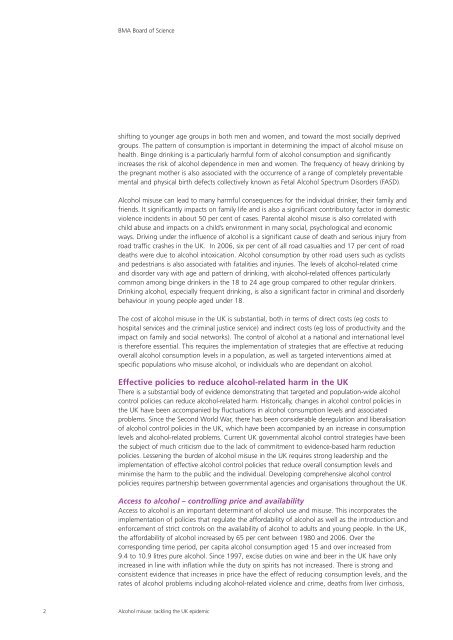Alcohol misuse: tackling the UK epidemic - London
Alcohol misuse: tackling the UK epidemic - London
Alcohol misuse: tackling the UK epidemic - London
Create successful ePaper yourself
Turn your PDF publications into a flip-book with our unique Google optimized e-Paper software.
2<br />
BMA Board of Science<br />
shifting to younger age groups in both men and women, and toward <strong>the</strong> most socially deprived<br />
groups. The pattern of consumption is important in determining <strong>the</strong> impact of alcohol <strong>misuse</strong> on<br />
health. Binge drinking is a particularly harmful form of alcohol consumption and significantly<br />
increases <strong>the</strong> risk of alcohol dependence in men and women. The frequency of heavy drinking by<br />
<strong>the</strong> pregnant mo<strong>the</strong>r is also associated with <strong>the</strong> occurrence of a range of completely preventable<br />
mental and physical birth defects collectively known as Fetal <strong>Alcohol</strong> Spectrum Disorders (FASD).<br />
<strong>Alcohol</strong> <strong>misuse</strong> can lead to many harmful consequences for <strong>the</strong> individual drinker, <strong>the</strong>ir family and<br />
friends. It significantly impacts on family life and is also a significant contributory factor in domestic<br />
violence incidents in about 50 per cent of cases. Parental alcohol <strong>misuse</strong> is also correlated with<br />
child abuse and impacts on a child’s environment in many social, psychological and economic<br />
ways. Driving under <strong>the</strong> influence of alcohol is a significant cause of death and serious injury from<br />
road traffic crashes in <strong>the</strong> <strong>UK</strong>. In 2006, six per cent of all road casualties and 17 per cent of road<br />
deaths were due to alcohol intoxication. <strong>Alcohol</strong> consumption by o<strong>the</strong>r road users such as cyclists<br />
and pedestrians is also associated with fatalities and injuries. The levels of alcohol-related crime<br />
and disorder vary with age and pattern of drinking, with alcohol-related offences particularly<br />
common among binge drinkers in <strong>the</strong> 18 to 24 age group compared to o<strong>the</strong>r regular drinkers.<br />
Drinking alcohol, especially frequent drinking, is also a significant factor in criminal and disorderly<br />
behaviour in young people aged under 18.<br />
The cost of alcohol <strong>misuse</strong> in <strong>the</strong> <strong>UK</strong> is substantial, both in terms of direct costs (eg costs to<br />
hospital services and <strong>the</strong> criminal justice service) and indirect costs (eg loss of productivity and <strong>the</strong><br />
impact on family and social networks). The control of alcohol at a national and international level<br />
is <strong>the</strong>refore essential. This requires <strong>the</strong> implementation of strategies that are effective at reducing<br />
overall alcohol consumption levels in a population, as well as targeted interventions aimed at<br />
specific populations who <strong>misuse</strong> alcohol, or individuals who are dependant on alcohol.<br />
Effective policies to reduce alcohol-related harm in <strong>the</strong> <strong>UK</strong><br />
There is a substantial body of evidence demonstrating that targeted and population-wide alcohol<br />
control policies can reduce alcohol-related harm. Historically, changes in alcohol control policies in<br />
<strong>the</strong> <strong>UK</strong> have been accompanied by fluctuations in alcohol consumption levels and associated<br />
problems. Since <strong>the</strong> Second World War, <strong>the</strong>re has been considerable deregulation and liberalisation<br />
of alcohol control policies in <strong>the</strong> <strong>UK</strong>, which have been accompanied by an increase in consumption<br />
levels and alcohol-related problems. Current <strong>UK</strong> governmental alcohol control strategies have been<br />
<strong>the</strong> subject of much criticism due to <strong>the</strong> lack of commitment to evidence-based harm reduction<br />
policies. Lessening <strong>the</strong> burden of alcohol <strong>misuse</strong> in <strong>the</strong> <strong>UK</strong> requires strong leadership and <strong>the</strong><br />
implementation of effective alcohol control policies that reduce overall consumption levels and<br />
minimise <strong>the</strong> harm to <strong>the</strong> public and <strong>the</strong> individual. Developing comprehensive alcohol control<br />
policies requires partnership between governmental agencies and organisations throughout <strong>the</strong> <strong>UK</strong>.<br />
Access to alcohol – controlling price and availability<br />
Access to alcohol is an important determinant of alcohol use and <strong>misuse</strong>. This incorporates <strong>the</strong><br />
implementation of policies that regulate <strong>the</strong> affordability of alcohol as well as <strong>the</strong> introduction and<br />
enforcement of strict controls on <strong>the</strong> availability of alcohol to adults and young people. In <strong>the</strong> <strong>UK</strong>,<br />
<strong>the</strong> affordability of alcohol increased by 65 per cent between 1980 and 2006. Over <strong>the</strong><br />
corresponding time period, per capita alcohol consumption aged 15 and over increased from<br />
9.4 to 10.9 litres pure alcohol. Since 1997, excise duties on wine and beer in <strong>the</strong> <strong>UK</strong> have only<br />
increased in line with inflation while <strong>the</strong> duty on spirits has not increased. There is strong and<br />
consistent evidence that increases in price have <strong>the</strong> effect of reducing consumption levels, and <strong>the</strong><br />
rates of alcohol problems including alcohol-related violence and crime, deaths from liver cirrhosis,<br />
<strong>Alcohol</strong> <strong>misuse</strong>: <strong>tackling</strong> <strong>the</strong> <strong>UK</strong> <strong>epidemic</strong>
















